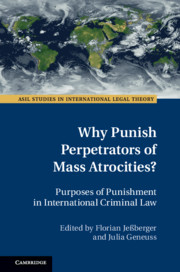Book contents
- Why Punish Perpetrators of Mass Atrocities?
- ASIL Studies in International Legal Theory
- Why Punish Perpetrators of Mass Atrocities?
- Copyright page
- Contents
- Contributors
- Preface
- Abbreviations
- 1 Introduction: The Need for a Robust and Consistent Theory of International Punishment
- 2 The Practical Importance of Theories of Punishment in International Criminal Law
- Part I Setting the Framework: Criminological, Historical and Domestic Perspectives
- Part II Rationales for Punishment in International Criminal Law: Theoretical Perspectives
- 9 ‘Can I Be Brought before the ICC?’
- 10 An Argument for Retributivism in International Criminal Law
- 11 An Expressive Theory of International Punishment for International Crimes
- 12 We’re Exhausting Ourselves, Let’s Get Busy Instead
- 13 Positive General Prevention and the Idea of Civic Courage in International Criminal Law
- 14 The Individual and the International Community
- 15 The Right to Punishment for International Crimes
- Part III Consequences for the Practice of the International Criminal Court
- Select Bibliography
- Index
14 - The Individual and the International Community
An Outline for a Combined Meso Preventive Theory of International Punishment
from Part II - Rationales for Punishment in International Criminal Law: Theoretical Perspectives
Published online by Cambridge University Press: 07 February 2020
- Why Punish Perpetrators of Mass Atrocities?
- ASIL Studies in International Legal Theory
- Why Punish Perpetrators of Mass Atrocities?
- Copyright page
- Contents
- Contributors
- Preface
- Abbreviations
- 1 Introduction: The Need for a Robust and Consistent Theory of International Punishment
- 2 The Practical Importance of Theories of Punishment in International Criminal Law
- Part I Setting the Framework: Criminological, Historical and Domestic Perspectives
- Part II Rationales for Punishment in International Criminal Law: Theoretical Perspectives
- 9 ‘Can I Be Brought before the ICC?’
- 10 An Argument for Retributivism in International Criminal Law
- 11 An Expressive Theory of International Punishment for International Crimes
- 12 We’re Exhausting Ourselves, Let’s Get Busy Instead
- 13 Positive General Prevention and the Idea of Civic Courage in International Criminal Law
- 14 The Individual and the International Community
- 15 The Right to Punishment for International Crimes
- Part III Consequences for the Practice of the International Criminal Court
- Select Bibliography
- Index
Summary
Andreas Werkmeister develops a combined meso preventive theory of international punishment. The underlying perspective of his theory is the legitimacy vis-a-vis the individual and the concept of human dignity is the foundational core. As a result, he highlights the limiting principles of punishment inherent to any punishment theory irrespective of its main purpose. After discussing problems with retribution and expressivism, he argues that a combination of different preventive theories provides for a suitable model for the justification of international punishment. Werkmeister differentiates between macro-, meso- and micro-levels, and makes an argument for targeted meso prevention. This way, the offender is punished to deter others, but is addressed as member of a case-specific transnational group. This way, Werkmeister develops a new form of prevention between special and general prevention.
- Type
- Chapter
- Information
- Why Punish Perpetrators of Mass Atrocities?Purposes of Punishment in International Criminal Law, pp. 228 - 256Publisher: Cambridge University PressPrint publication year: 2020

